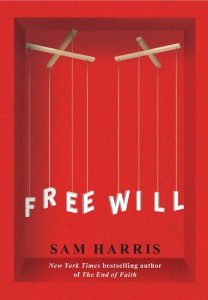Book Review: Free Will by Sam Harris

In his short new book Free Will prominent atheist Sam Harris, author of The End of Faith, Letter to a Christian Nation, and The Moral Landscape, makes the unsettling case that there is no such thing as free will, and that what we think of as free will is no more than an illusion. However, he argues, that does not damn us to some sort of pre-determined existence in which we should all sit back and just watch our lives play out. Even though free will is an illusion, the self-awareness of the illusion is itself a useful step towards better understanding and perhaps still influencing events.
People’s thoughts and intentions, Harris says, “emerge from background causes of which we are unaware and over which we exert no conscious control.” Every choice we make is made as a result of preceding causes. These choices we make are determined by those causes, and are therefore not really choices at all. A respected neuroscientist, he briefly outlines some of the science supporting this assertion, but more importantly explores what this fact means to us as human beings. In doing this, he draws some pretty subtle, but important, distinctions.
He draws a distinction between determinism and fatalism. Just because a choice is pre-determined at any particular point in time does not mean that life is completely mapped out. Things happen to us, and we learn from them. But how we learn from them is also something that “happens” to us. Behaviors of others influence our own behavior, as does our own make up. Actions of others have consequences on the choices we then make, which then effect the choices of others, in a nearly endless swirl of cause and effect. There are many causes and many effects. (The image of long-term weather forecasts being so hard to predict because a simple fluttering of a butterflies wings may have huge consequences down the line comes to mind.)
Harris also draws a distinction between conscious and unconscious reactions to the world. Even without free will, consciousness has an important role to play in the choices we make, Harris claims:
Decisions, intentions, efforts, goals, willpower, etc. are causal states of the brain, leading to specific behaviors, and behaviors lead to outcomes in the world. Human choice, therefore, is as important as fanciers of free will believe. But the next choice you make will come out of the darkness of prior causes that you, the conscious witness of your experience, did not bring into being.
The process that we think of as free will is the process of making the only choice that our previous experiences, body chemistry, and unconscious thoughts allow. The sheer amount of information and causes that go into these choices make it virtually impossible to predict every choice. But some choices are more predictable than others, and it is in realizing what went into these that one can gain insight into self, and also assign some practical moral responsibility.
Harris’ exploration of the moral and political ramifications of the realization that free will is an illusion is subtle, but powerful. If free will does not play into our actions, are we responsible for them? He explores how society has already grappled with these questions to an extent, in instances where free will has already been shown to play no role. Think of the person forced to commit a crime due to a gun being pointed to his head, or one who commits the same crime due to a tumor in his brain which can be surgically removed. In those cases the person is generally not punished or held responsible. Why then hold the person responsible who commits the same crime if they are not in control of their choice? His answer seems to come down on the side of one of societal self-consciousness. The unknown causes in the third case (as opposed to the known cause in the first two instances) that brought a person to commit the crime once are, especially if unchecked, likely to bring persons to a similar choice in the future. Punishment and responsibility are, at a societal level, part of what goes into the mix that creates a choice at any particular moment.
This is difficult stuff, and even Harris, a gifted writer who in his previous books has shown a definite skill in making complicated arguments clear, has some trouble fully explaining the ramifications of his argument. His use of the equally estimable Daniel Dennett as a foil (Dennett’s work argues for the existence of free will) shows that this is a question still capable of dissent, but it also shows Harris isn’t afraid to take on an intellectual debate, even with those he obviously admires.
At a more practical level, it also challenges the humanistic argument that, there being no God to control the world, it is up to us to try and create a just and beneficial society. Harris’ argument could be understood to say (given the absence of God) that nature has already dictated our fate, and it is just a matter of understanding all the many factors to see where that fate will lead. Of course he actually he argues that is not quite the case, but after reading his book it seems a close thing.
After reading the book, I am still not convinced there is no free will. (It makes me want to go back and read or re-read Dennett on the subject.) But Harris does raise intriguing questions and brings out some much needed scientific evidence on the subject. His exploration of the subject is both fearless and necessary. There is little doubt this 66-page book will engender thousands of pages of future discussions, much of it not nearly as well reasoned and thoughtful as this book is.
